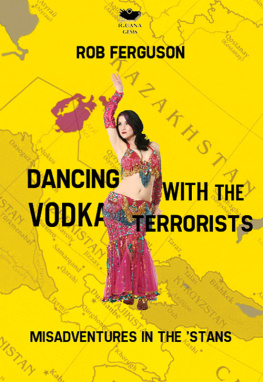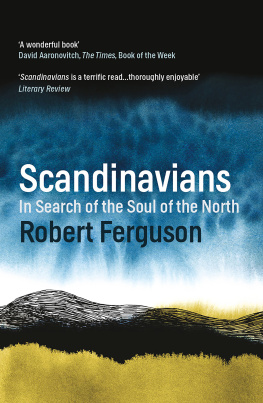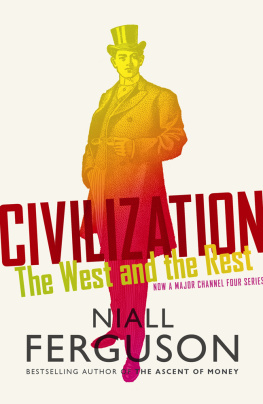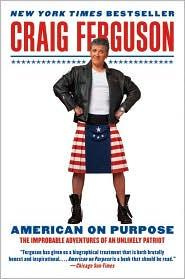
Copyright Robert W. Ferguson, 2002, 2012
Published by Iguana Books
460 Richmond St. West, Suite 401
Toronto, Ontario, Canada
M5V 1Y1
All rights reserved. No part of this publication may be reproduced, stored in a retrieval system or transmitted, in any form or by any means, electronic, mechanical, recording or otherwise (except brief passages for purposes of review) without the prior permission of the author or a licence from The Canadian Copyright Licensing Agency (Access Copyright). For an Access Copyright licence, visit www.accesscopyright.ca or call toll free to 1-800-893-5777.
Editor (of updated sections): Lisa Sparks
Book layout and design: Lisa Sparks, Greg Ioannou, Stephanie Martin
Cover design: Jane Awde Goodwin
Library and Archives Canada Cataloguing in Publication
Ferguson, Robert W.
Dancing with the vodka terrorists [electronic resource]: misadventures in the Stans / Rob Ferguson.
Published in 2003 under title: The devil and the disappearing sea: a true story about the Aral Sea catastrophe; published in 2004 under title: The devil and the disappearing sea, or, How I tried to stop the worlds worst ecological catastrophe.
Includes bibliographical references.
Electronic monograph.
Issued also in print format.
ISBN 978-1-927403-25-9 (EPUB)
1. Ferguson, Robert W.TravelUzbekistan. 2. Environmental degradationAral Sea Region (Uzbekistan and Kazakhstan). 3. NatureEffect of human beings onAral Sea Region (Uzbekistan and Kazakhstan). 4. UzbekistanDescription and travel. 5. Aral Sea Watershed (Uzbekistan and Kazakhstan)Environmental conditions. 6. Asia, CentralSocial conditions1991-. 7. MurderUzbekistan. I. Ferguson, Robert W. Devil and the disappearing sea. II. Title.
DK948.867.F47A3 2012 958.7 C2012-907277-X
A version of this book was published as The Devil and the Disappearing Sea in 2002 (hardcover) and 2003 (paperback).
This is the original print edition of Dancing with the Vodka Terrorists: Misadventures in the Stans.
PRAISE FOR THE FIRST EDITION OF THIS BOOK
the cast of characters drives this narrative, a cast so odd, so uncooperative toward one another, so immune to reason and so venal, that they couldnt have been invented by Carl Hiassen or Elmore Leonard. Luckily for Ferguson the writer, he finds himself another character in a very funny if depressing corruption-racketeering-kickback plot that ends in murder. To his credit, Ferguson tries to draw this shady group, his temporary colleagues, with some empathy, and never crosses into outright parody. Ferguson has crafted something unique, something that blends memoir and documentary with noirish satire, and manages its shifts in tone very smoothly.
Globe & Mail
.eminently readable, held together by the authors careful research and attention to detail. As Ferguson travels through the region, he details its bold, colourful history of intense beauty and violent conquest, of Silk Road havens and Soviet brutalism. He vividly describes cultures in perpetual flux and ancient ideas concerning everything from religion to irrigation. He also has a keen eye for character. Team members are evoked memorably; toadying yes-men, corrupt apparatchiks, even the occasional idealist and loyal friend. Key figures, like Mr. G. and Shakhlo Abdullayeva, the teams office manager, are particularly well-drawn.
National Post
The story of the Aral Sea, the most stupefying and outrageous ecological disaster in human history, is the central narrative [of] Rob Fergusons [book] its an edge-of your- seat ride [and] has the pacing of a detective novel and characters out of Evelyn Waugh. Who would have thought a first-time author could pull off something like that?
Georgia Straight
If Hollywood ever makes a movie based on The Devil and the Disappearing Sea, Rob Ferguson would like Kevin Spacey to play him. Such a film would be a taut thriller.
Victoria Times-Colonist
The pith of Fergusons fascinating debuta hybrid of sightseeing travelogue, political history lesson, dire ecological warning and unsolved murder mysteryis that the Aral Sea, once the fourth-largest inland body of water on Earth, is shrinking fast. His wry account of a turbulent year clearly articulates the tragic consequences of what he now deems inevitable failure Readers will finish the book knowing with certainty why the Aral Sea disaster has been described as a slow-motion Chernobyl.
Publishers Weekly
this absorbing real-life thriller reads like novel, though if it were fiction, it would be billed as a black comedy The story is so absurd it would be funny if it were not about such an important issue. In this, his first book, Ferguson merges statistical information into the flow of the book with ease. He also details the history of the region, providing useful background to the events of his 11 months there. He describes each of the places he visits with a travellers practised eye, providing an engaging travelogue on the legendary cities of the Silk Road somehow he managed to maintain his dedication and sense of humour, resulting in this informative and compelling book.
Winnipeg Free Press
Best book of the year, Outpostmagazine:
A weird, entertaining and informative amalgam of a book: part memoir of Fergusons time as an NGO worker in Uzbekistan, part ecological nightmare, part satire, part absurdist noir. From the unavoidable tragedy of the disappearing Aral Sea, to the machinations of a corrupt bureaucracy, Ferguson finds himself in one bizarre scenario after another, always with his wit intact.
Outpost magazine
For my parents,
Margaret and Bob Ferguson of Winnipeg
But the majestic river floated on,
Out of the mist and hum of that low land,
Into the frosty starlight, and there moved,
Rejoicing, through the hushd Chorasmian waste,
Under the solitary moon; he flowd
Right for the polar star, past Orgunj,
Brimming, and bright, and large; then sands begin
To hem his watery march, and dam his streams,
And split his currents; that for many a league
The shorn and parcelld Oxus strains along
Through beds of sand and matted rushy isles
Oxus, forgetting the bright speed he had
In his high mountain-cradle in Pamere,
A foild circuitous wanderer till at last
The longd-for dash of waves is heard, and wide
His luminous home of waters opens, bright
And tranquil, from whose floor the new-bathed stars
Emerge, and shine upon the Aral Sea.
from Sohrab and Rustum: An Episode
by Matthew Arnold
And He it is Who sends the Winds as heralds of glad tidings,
going before His Mercy, and We send down pure water from the sky,
That with it We may give life to a dead land, and
slake the thirst of things We have created, cattle and men in
great numbers.
And we have distributed the (water) amongst them, in order that they
may celebrate (Our) praises, but most men are averse (to anything)
but (rank) ingratitude.
The Quran, Surah 25:4850
AUTHORS NOTE
This book, originally published as The Devil and the Disappearing Sea, is based on actual events that took place in the five former Soviet republics of Central Asia during the year 2000. All persons identified are real and carry their own names, except for a few minor characters whose names I was unable to recall. This is a nonfiction work, and the events and narrative have been recreated as faithfully as possible, through recollections, journal entries, research and discussions with my former co-workers, to whom I am greatly indebted. The dialogue aims to capture the essence and significance of the conversations at the time, but as it was not recorded and was sometimes filtered through an interpreter, it may not comply exactly with the speakers words. I also took a few liberties regarding the timing of events. However, my intention has been to remain as true as possible to the characters and the quintessential flow of events as I experienced them. In 2012 the original version was revised slightly, an introduction and epilogue were added, and it was given a new title.













